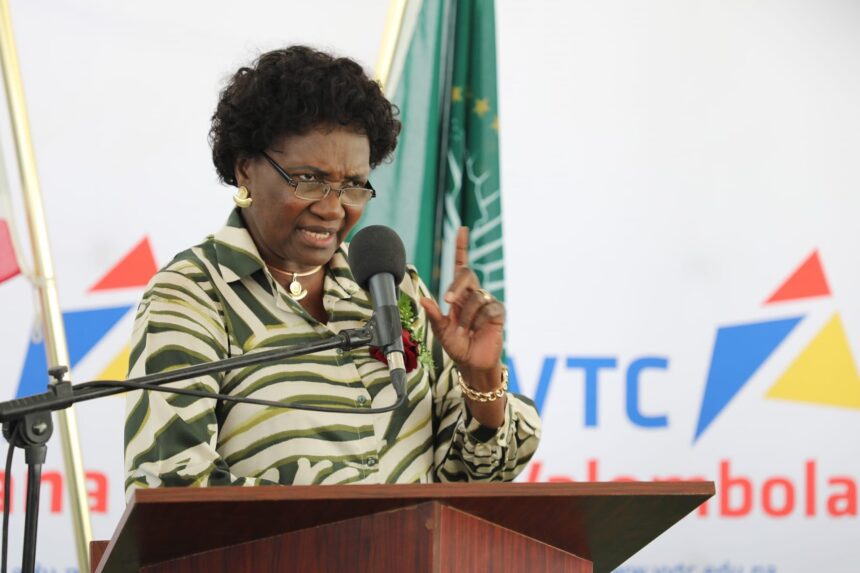EENHANA – The minister of Higher Education, Technology and Innovation, Itah Kandjii-Murangi says technical and vocational education and training (TVET) holds the tools for the future of the youth.
“Our focus should now be on outcomes, effectiveness and enhanced access in generating more value from the resources available for TVET,” she said.
Kandjii-Murangi made these remarks during the inauguration of the NEV Hub PV/Solar Plant at Eenhana in the Ohangwena region on Friday.
The plant, which was fenced off with razor mesh and had CCTV systems installed, will increase generation capacity from 80 to 110 kiloWatts.
The minister said the promotion of technical and vocational education and training (ProTVET) project complements development cooperation in the priority area of sustainable economic development, with key objectives including the provision of support to key elements of the TVET system, and the enhancement of overall industry participation.
She stressed that the government understands the significance of obtaining and sustaining the skills and expertise needed to grow the economy.
“Creating jobs – and making sure they are the right jobs – will be how we lift our people out of poverty; how we empower thousands of women and young people, and how we develop a strong, secure, and robust economy.”
She added that the TVET sector, as an integral part of the mainstream national education system, is critical for future competitiveness.
“We have been impressed by the manner in which the NTA is dealing with the priorities set and the related challenges. It remains critical, however, for the ministry and the NTA to maintain the momentum and commitment towards successfully transforming the provision of TVET in Namibia,” she said.
Kandjii-Murangi added that Namibia enjoys a very high number of annual sunshine hours and offers one of the highest solar energy yields in the world.
In addition, the installation of photovoltaic solar plants at some public VTCs is an encouraging and heartening development.
“The main advantage of solar electricity is the cost saving aspect over the long-term. Furthermore, from a corporate social responsibility perspective, we are now able to generate our own green electricity and operate in a manner that reduces our environmental impact and lower our carbon footprint,” she said.
Kandjii-Murangi urged VTCs to take full ownership of these installations and help maintain them as well as protect them against destruction, theft and vandalism.
Also speaking at the occasion, the development cooperation counsellor at the German embassy, Thomas Feidieker, said this partnership has taken shape through bilateral agreements over the past 34 years, all aimed at actualising Namibia’s developmental agenda.
“Over the years, our collaborative efforts have contributed to successful projects supporting Namibia’s socio-economic development, fostering a robust job creation agenda driven by small and medium enterprises as well as the industry,” he added.
Feidieker said in the last 12 years, the German Federal Ministry of Economic Cooperation and Development (BMZ) has provided approximately N$650 million for technical cooperation in TVET, implemented by GIZ ProTVET.
In addition, the German Development Bank, KfW, is in the final stages of launching a project with the NTA to render financial support to the TVET sector, with a total commitment of approximately N$260 million by the BMZ.
He further stressed that the planning, design and installation of grid-tied solar/PV plants at four public vocational training centres: Nakayale, Eenhana, Valombola and Gobabis, was agreed upon with their Namibian partners during the second phase of ProTVET, which ended in September 2022.
“This would not only help the TVET system to respond to critical skills needs in this emerging sector, but would provide the much-needed impetus for TVET to reposition itself and serve as a catalyst for economic development and industrialisation in Namibia,” he stated.
He added that the German government is confident the partnership will continue to grow, as Namibia now shares the same aspiration as Germany of becoming a pioneer in renewable energy by 2030. –fhamalwa@nepc.com.na


